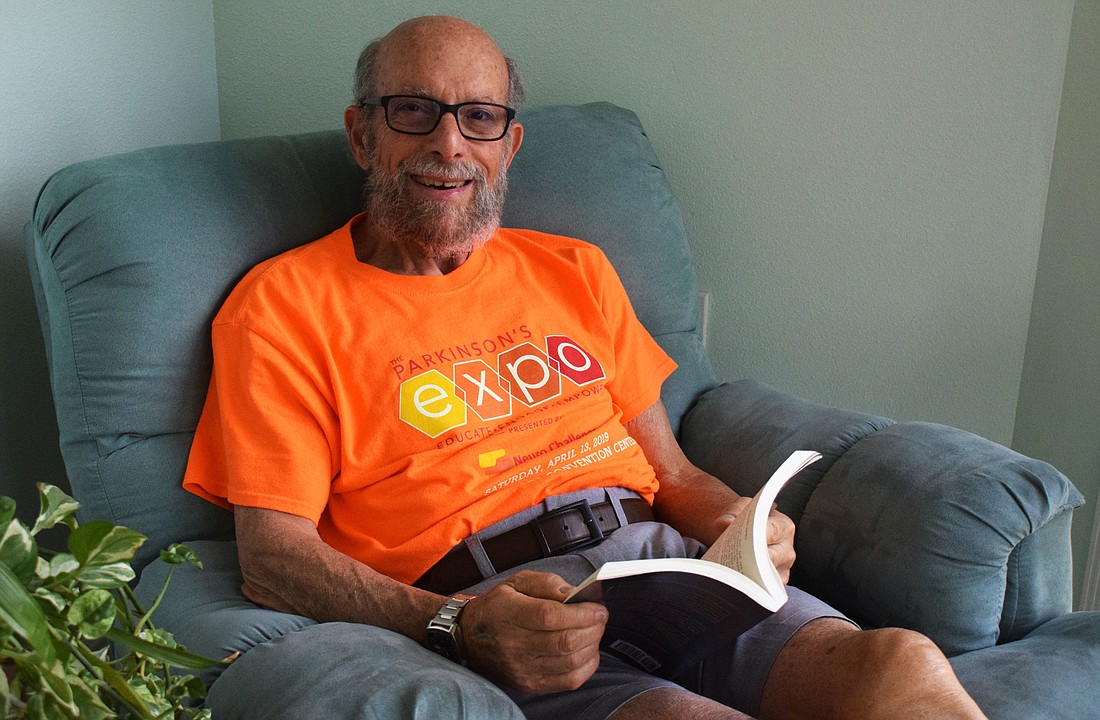- November 26, 2024
-
-
Loading

Loading

East County’s Steven Oppen wakes up every day at 6 a.m. feeling a bit groggy.
The grogginess is a side effect of his Parkinson’s disease medication.
By 7 a.m. Oppen is out of bed, at the table eating breakfast and saying goodbye to a caregiver that stays with him each night.
Oppen makes sure any important task that needs to be accomplished each day is completed before noon.
“I try to take advantage of the mornings because that’s when I’m sharpest,” Oppen said. “The afternoon is when I start seeing myself slow down and I need to take some breaks.”
If he’s up for it in the afternoon, Oppen might participate in programs the Neuro Challenge Foundation provides.
The Neuro Challenge Foundation is a Sarasota-based nonprofit dedicated to providing services to support people with Parkinson’s disease and their caregivers.
“The Neuro Challenge Foundation has a breadth of programs that is unmatched by anyone else,” Oppen said. “They are the local organization that provides classes and get-togethers for every aspect of Parkinson’s that you can think of from problems that we have mentally to problems we have physically. If you can’t find something that piques your interest, you haven’t tried very hard.”
Neuro Challenge Foundation provides care advisors that help those with Parkinson’s and their caregivers navigate the management of the disease. The nonprofit also provides monthly education, support and therapeutic programs.
Neuro Challenge Foundation will host its annual Parkinson’s Expo at the Bradenton Area Convention Center in Palmetto as well as virtually March 26. The daylong expo will include presentations from nationally renowned Parkinson’s experts.
“The expo is a wonderful event,” Oppen said. “There are excellent lectures and presentations throughout the day.”
Oppen was diagnosed in 2013 after his brother-in-law, Mike Difeo, noticed a change in Oppen’s gait.
“I knew that had been in existence for a while, but I never pursued it much further,” Oppen said. “(Difeo) strongly suggested I see a neurologist.”
Oppen saw a neurologist in Lakewood Ranch and was diagnosed with Parkinson’s disease.
Oppen said most Parkinson’s disease patients go through a period of denial after their diagnosis, but Oppen didn’t dwell on his diagnosis for too long.
“I knew I couldn’t ignore the things people were mentioning to me,” Oppen said. “I tend to read a lot, so I decided to read the literature about Parkinson’s. I saw a lot of what I was experiencing in that literature. I realized the prognosis was correct. … I wanted to get on with it and do what I could to fight it.”
Since then, Oppen has volunteered for the Neuro Challenge Foundation and even served on the nonprofit’s board for three years.
“I wanted to try and be a part of the solution, so to speak, rather than part of the problem,” Oppen said. “I didn’t want to just sit there and be a Parkinson’s patient.”
Oppen has found ways to help ease his symptoms including going to physical and speech therapy.
He joined a program called PWR! Moves that taught him exercises to help with his mobility and stretching.
He also listens to a tape through the Parkinson’s Voice Project and follows along with speech exercises including saying the letter ‘a’ for 10 seconds or saying the letter in a sliding scale. The Parkinson Voice Project is a Texas-based nonprofit that provides speech therapy. Oppen also reads aloud following along with videos.
“They put out practice videos that take me through several speech exercises that are designed to get me to speak with intent,” Oppen said. “That is the real secret, to speak with intent.”
Oppen continues to do research to see the new science that is trying to stop or reverse Parkinson’s disease. He said that as patients continue to take oral medication over time, the medication becomes less effective.
“I have reached a point where my morning dose is quite helpful to me, but as the day goes on, the effectiveness dissipates,” Oppen said. “There’s not much you can do about it.”
So Oppen continued to research other ways to lessen his symptoms. He found deep brain stimulation, which is a neurological procedure that uses implanted electrodes and electrical stimulation to treat movement disorders related to Parkinson’s.
At first, deep brain stimulation was only mostly effective on tremors, but Oppen doesn’t have tremors. The procedure has now become effective in minimizing the effects of dyskinesia, which Oppen does have.
After consulting with his neurologist, Oppen decided to go to the University of Florida Health Movement Disorders Centers of Excellence to see if he qualified for deep brain stimulation. He passed the tests and went forward with his first surgery to insert an electrode into his skull. He has a second surgery to insert a second electrode at the end of March and will have his final surgery in May so he can begin the electrical stimulation.
He won’t know until a few months after the final surgery whether deep brain stimulation was effective for him.
“After this DBS surgery, I’m hoping there’s a chance I could return to golf,” Oppen said. “I played golf quite a bit before Parkinson’s disease invaded my life.”